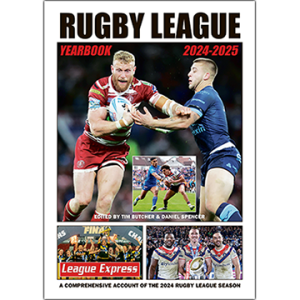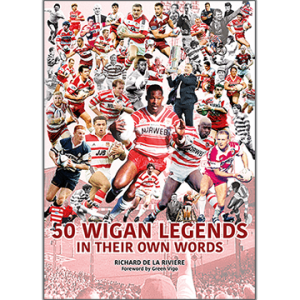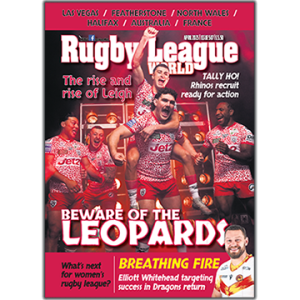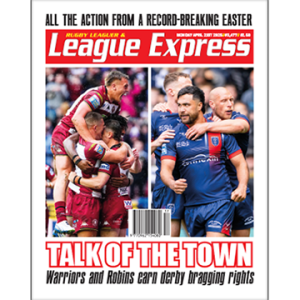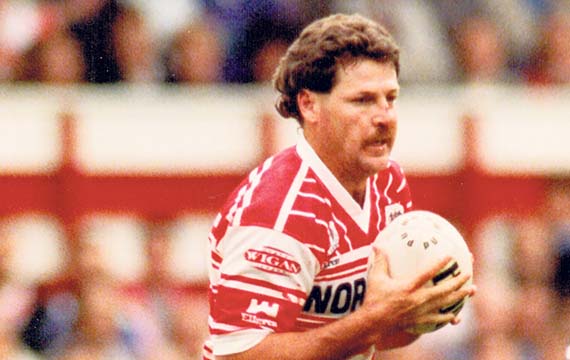
An All-Time Great
One of the great attacking centres of the last half-century, Gene Miles was a major force in some of the best teams the sport has ever seen – the Queenslanders that dominated State of Origin in the 1980s, the undefeated 1986 Kangaroos when he kept Mal Meninga out of the side and Wigan in 1991-92 who swept all before them.
Miles was also one of the original Brisbane Broncos in 1988 and succeeded Wally Lewis as captain in 1990.
If you could relive one day from your career, which would it be?
I won Grand Finals with Wynnum Manly in the Brisbane competition, and I’d say 1986 was the stand out, when we beat Brisbane Brothers. Wally had just taken over as captain-coach and we had quite a bit of turmoil leading into that year, with the previous coach being moved on. We had a young side, so to come out with the Premiership was very satisfying.
Why were Queensland so successful in the early days of Origin?
Right through the ‘80s, we had a team that had played so much football together in Brisbane and a lot of us were of a similar age. We didn’t have a lot of stock to pick from, so the selectors stayed loyal, and we got some great combinations happening. We had great coaches like Artie (Beetson) and Wayne (Bennett), and we played above ourselves. We played against superstars, but if you tackle them around the legs, they still fall over.
Can you pick one highlight of your Origin career?
I played in seven series, winning six, but I’m going to choose the one I lost as the highlight. We got whitewashed in 1986 but, looking back, it was the most competitive series I played in and there was never more than a converted try in each game. The Kangaroo Tour was largely made up of players from that series and it set me up for a great year with the Grand Final and that tour.
You didn’t make the Test team in 1982, but what are your memories of that Kangaroos Tour?
I’d only been in Brisbane for two years, having moved from Townsville, so it was a great honour to be selected, but I knew I was going to be playing the midweek games because of Mal Meninga and Steve Rogers. There were 27 other guys, and the friendships made on that tour have stayed with me for life.
When you’re a squad member, do you watch the Tests hoping for things not to go so well so you might get a crack?
Yeah, obviously there might be a bit of that sometimes, but on that particular tour we were just marvelling at what the team was doing. They played some super football. But the camaraderie ensured we were all had a role to play on matchday.
What do you remember of playing for Oceania against Europe in France in 1984, a game you won 54-4?
I was proud to be involved and Wally, Mal and I often talk about it. We had Kiwis, Papua New Guineans and Aussies and we were up against Great Britain and France players. We had a great week, starting with a bonding session in Sydney. The Papuan New Guinea lads loved it – they were starry eyed sitting on a plane with Wally and Mal! It was strange playing in Paris. There was no grass on the field. It was like a cow paddock, so not many of us wanted to hit the deck, and because of that, there were some unbelievable ball skills on show!
You toured again in 1986 and this time kept Mal Meninga out of the team.
We’d played a series with the Kiwis a couple of months before the tour and when we got to England, we played three club games before the Tests, so we had the miles in our legs for the Tests. Old Trafford hosted the first Test and I scored three tries. We had a handy lead, but the Brits fought back. The crowd was sensational, but they still applauded when we scored some great tries.
Were you lucky to win the third Test? There were rumours some of your team were the worse for wear. Was that true?
We certainly weren’t the worse for wear, we wouldn’t be so disrespectful, but mentally perhaps we just thought we could turn up and win again, but Great Britain were excellent. That was the most competitive Test we had. We were very lucky. Wally produced something special when he scored the try that clinched the match late in the game.
You mentioned the Kiwis. Did you come up against Olsen Filipaina much?
No, thank God! He always gave Wally such a tough test, but I was injured for 1985 and missed a very controversial tour which, in hindsight, was no bad thing.
You were one of the inaugural Broncos in 1988. What do you remember of the build-up and the first match?
There was so much happening in 1988 over here and the build-up that the Broncos had was huge. We all came from different backgrounds in terms of the Winfield Cup, and it didn’t sit well that the best players would be taken from the local competition. We had a squad of about 30 players, and they came from all over Queensland with a few from Sydney that Wayne picked up. We never started training as early as we did with the Broncos, because going into the Sydney comp, as it was known then, was a step up.
Manly were our first opponents and they were the 1987 Premiers. We couldn’t have had a tougher start. I don’t think we sold it out, which was very strange because it was basically our Origin side that trotted out that day. We hammered Manly. Wally and Alf (Allan Langer) had great games, and Terry Matterson kicked a record number of goals. We hit the ground running and won our next five games.
What happened when Wally was sacked as captain?
That was fun – not! Wayne was going to move Wally on as captain because he wasn’t getting from him what he thought he could. Wally probably wasn’t mixing with the younger brigade of the team. He had a couple of injuries too. Wayne asked me to take the captaincy and I had to think about it because of my relationship with Wally. I figured if I accepted it, he’d accept it because it wouldn’t be going to someone like Kevvie Walters or Alfie Langer, who he might have thought hadn’t quite earned it at that point. But I was totally wrong. He thought I shouldn’t have accepted it. We’re still great mates today, but we had a couple of rocky years. But the players got behind me in 1990 and we tied for the Minor Premiership. I stayed at the Broncos for one more year and Wally went to the Gold Coast Seagulls.
Did Wigan approach you in the 1980s?
Maurice Lindsay was extremely keen to get me over there on a number of occasions, in particular after we toured in 1986. He’d had Brett Kenny and Greg Dowling, and they talked about what a great club it was. Maurice was the Great Britain manager, so it seemed like I had constant contact with him.
When I did eventually sign in 1992, Maurice was instrumental in getting me there. I remember him saying he wanted to see me run out at Wembley and I was so proud when I did that. I owe so much to him. When we arrived, we stayed at his house. Not with him – he moved out so we could move in! He moved heaven and earth to make us feel comfortable. Whatever he said, he did. We didn’t want for anything. My son was born in England, and he even helped with things like baby seats.
How would you compare the Wigan team of 1991-92 to the best teams you played for in Australia?
They were unbelievable! That team would have been competitive in any competition. It was basically the Great Britain team and when they toured a few months later, they had a lot of Wigan players. They had so much depth and brilliance. We could have a couple of injuries and replace a quality player with another quality player.
Is Martin Offiah the best winger you’ve ever seen?
Yes, probably. All you had to do was put him in a gap and then turn around and wait for the kick-off. I remember refs trying to chase him down and they would give up too. I’ve never seen anyone go from zero to whatever speed he got to so quickly. He scored ten against Leeds in one semi-final and five against Bradford in another. We also won the World Sevens in the rain in Sydney, and he left everyone in his wake in that too.
You were the Maroons chairman of selectors when Allan Langer was recalled to the side in 2001. How did it happen?
We’d just been beaten heavily in the second game and as we were leaving on the bus, Wayne leaned over and said, “What do you think about getting Alf back?” I agreed straightaway. We spoke to the powers that be, and we got to work on it straightaway. We kept it under the radar and got the plans in place. It was a stroke of genius.
And, of course, Alfie was magnificent. No one thought in their wildest dreams he could play that well. To go from Warrington to the level required at Origin was fantastic and it wrapped up the series for us.
Tell us about FOGS and the Artie Academy that you are involved in.
FOGS stands for former Origin greats. Every player to have played Origin footy is a FOG. Every player has a number from one (Artie Beetson) to 221 (Tom Flegler). I’m number 28.
We’re hands on with the Queensland team, the managers and supporting the team. The Artie side of that is using the profile of the FOGS to do government-funded programmes in schools with indigenous kids – better educated.
Arthur was a great man, and it was an honour to be coached by him and to name the Artie Academy after him. He was stoked to have his name used, because he was passionate in helping his people. I made my debut for Queensland with Arthur in 1981 in the Interstate series. He coached me from 1982 in Origin. It’s ten years since we lost him. I was a huge fan of his and just being on the bus to training was so much fun. All you wanted to do was play for him.
You told your daughter not to date a footballer, yet she married Corey Oates.
Ha – yes, that is absolutely true! I know footballers and there are a few rogues among us, so I wasn’t keen on a footballer being brought home with her. Corey and I get on very well, but he knows the rules!
The above content is also available in the regular weekly edition of League Express, on newsstands every Monday in the UK and as a digital download. Click here for more details.

